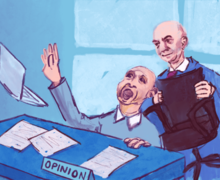Roberts’ record lacks full First Amendment support
When Chancellor Nancy Cantor gave her opening remarks at the Newhouse III dedication sponsored by Z89 on Sept. 8, she commented more about the day’s weather than she did about the one topic on everyone’s mind. No, not the free T-shirts that Z89 ran out of before the event even began. The physical reminder of what the new addition to the S.I. Newhouse School of Public Communications stands for: the First Amendment and freedom of speech.
Perhaps Cantor was wise last week not to go into the subject, considering her track record and the unending criticism she has received in regards to student free speech. However, today I can’t help but laugh to myself when I think of Chief Justice John Roberts speaking at the official Newhouse III dedication, especially considering his own track record with the issue during his short tenure on the Supreme Court.
It’s an extreme honor to have the chief justice of the United States to help usher in a new era of Newhouse, and the school should applaud itself for keeping up the tradition of bringing such high-profile speakers to dedicate each new addition. But it’s also extremely unfortunate that the same man who will stand in Hendricks Chapel today and undoubtedly lecture on the merits and values of the First Amendment to hundreds of future and current media leaders has not held up his end of the bargain so far.
This summer, Roberts sided with fellow conservatives on the Supreme Court to silence a high school student’s right to free speech in Morse v. Frederick, better known as the ‘Bong Hits 4 Jesus’ case.
In 2002, Joseph Frederick, a high school senior in Juneau, Alaska, unfurled a 14-foot banner that read ‘Bong Hits 4 Jesus’ at a school-sponsored event. Because of his message, Frederick was suspended from school for 10 days.
There’s no doubt that Frederick’s banner was disruptive and a ploy for attention. Deborah Morse, the principal of Frederick’s school, was justified in requesting that Frederick remove it from sight to prevent further interruption. But Morse was not right in suspending Frederick because of the content of his message. Her decision set off a chain of events which led the issue to the Roberts, whose majority opinion jeopardized the future of student speech.
Roberts and the rest of the conservative majority on the Supreme Court disagreed with the banner’s promotion of illegal drugs. They placed more importance on shielding high school kids from messages about drugs than on permitting a student to express his belief.
Ronald Collins, a scholar at the First Amendment Center, said Roberts’ opinion in the Morse v. Frederick allows school administrators to put ‘blinders’ on when a student is caught promoting illegal drug use and could cause a situation in which many discussions about illegal drugs are silenced.
‘It lacked the kind of nuance one sensitive to First Amendment rights would bring to the table,’ Collins said of the judgment.
If Roberts is smart, he’ll take a page out of Cantor’s book and avoid the topic of student speech altogether during today’s ceremony. Instead, he’ll use his time here to look at the words of the First Amendment etched in glass on Newhouse III’s western face and rethink its true meaning.
Steve Kovach is a biweekly columnist for The Daily Orange. He can be reached at sjkovach@gmail.com.
Published on September 18, 2007 at 12:00 pm





